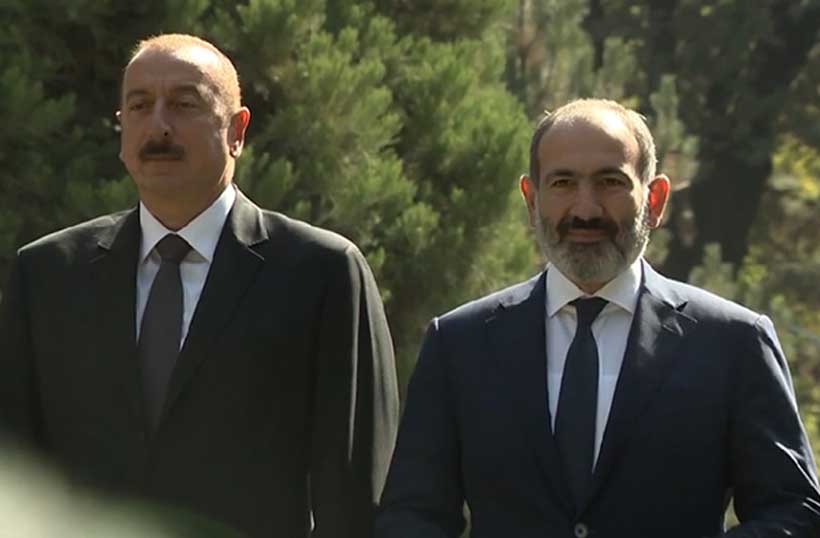
YEREVAN/BAKU
Armenian Prime Minister Nikol Pashinyan’s landslide victory over nationalist foes in Sunday’s vote could produce history.
At stake is a final peace with neighbour Azerbaijan. And historical foe Turkey.
Pashinyan’s “Civil Contract” party got at least 75 of 101 seats in the National Assembly – an unrivalled mandate.
His party blasted the “Armenia” bloc led by nationalist ex-President Robert Kocharyan by 55-21 percent.
Kocharyan’s bloc said irregularities marred the election, but no analysts said they believed that any infractions – both sides alleged them – were close to changing the outcome.
No other party got enough votes to enter the National Assembly, meaning the former journalist and writer’s movement will control an overwhelming constitutional majority.
Pashinyan swept to power in 2018 on public frustration with corruption, poor living standards, and massive emigration.
MANDATE TO MEND REMAINING ISSUES
The outpouring for the 46-year-old means a free hand in handling the remaining issues between Armenia and Azerbaijan.
Pashinyan’s decisive win in the snap poll stood logic on its head. Detractors accused him of “losing” the 30-year war to Azerbaijan – yet he emerged as a decisive winner. Some accused him of “deliberately” ceding occupied Azerbaijani territories.
He beat back 67-year-old Kocharyan, who emerged from retirement to lead his nationalist “Armenia” bloc.
ROAD AHEAD
The remaining issues are border demarcation between the two former Soviet countries. As well as the issue of re-establishing a trade and transit corridor between Azerbaijan’s exclave of Nakhchivan, cut off from the rest of the country since 1991, via a 40-km strip of Armenian territory.
And there is the fate of what is to become of the former Azerbaijani Soviet autonomous district of “Nagorno-Karabakh” or “Upper Karabakh”. Some parts are controlled by Armenian separatists and accessible via the main road through Azerbaijan.
WAR “LOSER” TURNED “WINNER”
Reversing 30 years of humiliation, Baku retook seven districts that Armenian forces had occupied since the early 1990s.
More than 600,000 Azerbaijanis were ethnically cleansed from the regions and the former Azerbaijani Soviet Nagorno-Karabakh region. The areas were stripped of anything valuable, from sheet metal to bricks to electrical wiring.
Armenian forces did nothing with the huge swathes of territory, and they became a liability.
He openly said there was no way Armenian forces had the capability to hold onto the occupied Azerbaijani lands. He signed a Russian brokered armistice to end the six-week offensive, saying it was the only way to survive what could be a worse fate for the country.
Pashinyan even dared to say in Parliament that despite the historical enmity with Turkey, Azerbaijan’s ally, the countries were, after all, neighbours. This earned him shouts of “traitor” and “Turk” at rallies.
REACTION FROM AZERBAIJAN
Azerbaijan’s government expressed cautious optimism. “Azerbaijan hopes that the new government of Armenia will analyze the causes of the internal political crisis in the country and draw the right conclusions, Foreign Minister Jeyhun Bayramov said. “Extraordinary parliamentary elections were held in Armenia…the formation of a new government is expected. We believe that the political leadership of Armenia will understand the real reasons for the internal political crisis, and after analyzing, will draw the right conclusions,” Bayramov said.
MP Rasim Musambekov said the vote showed a rejection in Armenian society of “revanchism” and militarism, though he was careful not to praise Pashinyan.
“The Armenian people did not believe the sweet-talked promises these former leaders of Armenia [Former Presidents Kocharyan and Serzh Sargsyan] who chased their sons to slaughter. People chose a demagogue and amateur [Pashinyan] rather than thieves and murderers. Who for two dozen years robbed and raped the country,” he told the Tribune.
“I think Pashinyan will fulfil the obligations reflected in the peace document of November 10, 2020, signed by the presidents of the Russian Federation and Azerbaijan. For all the hesitations and inconsistencies, Pashinyan learned the lesson that was taught during the Second Karabakh War. I think it will not be without difficulties. But the process of reconciliation in the region will move forward step by step,” he said.
Musambekov added that work was intensifying on re-opening trade routes closed for 30 years.
Eldar Namazov, a former advisor to late President Heydar Aliyev, told the Tribune the results of Pashinyan’s overwhelming victory would be profound. Many in the country’s government feared a return of the “old guard” led by Kocharyan could bring more destabilisation.
“The results of the elections in Armenia will have a very serious impact.”
“They … are moving towards peace with neighbours through gradual mutual recognition of borders, territorial integrity, and the opening of trade relations with Azerbaijan and Turkey,” he said.
